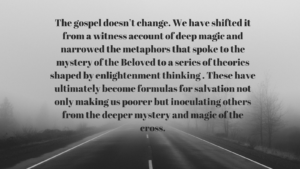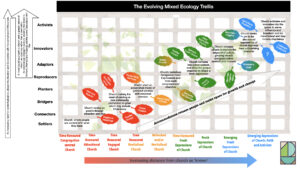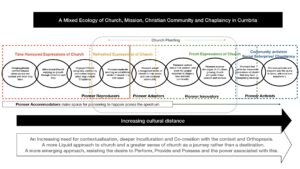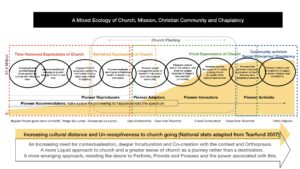This a longer post than usual. Ive shared this paper with a few people and they have asked me to post it more widely. I’ve had trouble with the images so had to upload as PDF so you will nee to click sorry
Its been 8 years since moving from deliberately being on the outside edge of church to moving to the inside edge of the institution. We have had ups and downs and for the most part I have loved the roller coaster. I have used different theories of change over that time, had brilliant colleagues and seen some great stuff emerge. I have been given a freedom of movement, support to experiment, opportunities to lean into my gifts, encouraged to play pirate, and we have got a lot of stuff done and had a lot of fun, tears and laughter along the way. At our peak before covid we were seeing a new fresh Expression of church emerge every few weeks, and overall Fresh Expressions now made up around a quarter of the church in Cumbria. I hope our work has been Christ centred, and we have tried to work both at a practical level on the ground and taking this learning to work at a cultural and systems level. I think mission is much more of an art form or craft than something more mechanistic or technical. Indeed when we reduce the mission of God to a simplified process or technology for conversion we slip away from the heart of the gospel.
I have always thought quite strategically and tried to adopt a posture and missional humility that is rooted in Jesus’ temptations in the wilderness where he resisted the power to provide, perform or possess. I have often failed to live up to this. 8 years on and maybe I’m starting to find a way to talk about how to make space for the craft of mission in the systems I find myself in.
There are two key concepts that have helped start to find that language. The first concept is a process Wheatley and Frieze’s Two Loops of change which I have discussed before and secondly the CYNEFIN framework. The focus of so much my first few years was on the bottom arrow of the two loops, Naming, Nourishing, Narrating and Networking what was happening on the ground in the emerging mission and Nurturing more and more of this.
The result was a stronger missional ecosystem, that planted over 100 fresh expressions, some great people and practice on the ground, and a fledgling mixed ecology of church. We made mistakes along the way particularly around how we held the tension between time honoured and fresh expressions of church, how we communicated and simply by dropping the relational ball at times because the scale and pace of the change at times was overwhelming. As the emerging system gained traction it was clear that there was more going on here as we sought to follow the mission dei in our communities and reflect that back into our systems. Perhaps it was a practical outworking of what Taylor calls “one mission in two directions out into the world and back into the church”. (which I also think is at the heart of Pioneer Ecclesiology). As momentum built eventually, we were asked by the bishop what would this look like to help the whole transition and the partnership with CMS was formed. A key piece of work then needed was to find a way to talk about the whole system as one rather than its two constituent parts and so we developed Mixed Ecology Trellis. This really helped us counter some of the previous failings and changed the conversations on the ground because everyone can find themselves on the Trellis. It also recognises that people can have multiple places of belonging[1] eg a time honoured church can also have fresh expressions, innovate etc. So instead of setting people up against one another it honours the diversity and better reflects a more authentic ecclesiology that recognises the multiplicity of what church is.
However we also recognised the value of the two loops and that we needed to take the learning from the emerging system if we are to have any hope of growing a mixed ecology that wasn’t just a technical change but something more crafted and genuine. So with what seemed seems like an impossible challenge from the bishop to try and take the whole church with us I started to play with the how the two loops translating them into the time honoured and emerging church and mapping the Trellis onto the loops alongside who and how we might support the transition.
The second concept is The CYNEFIN framework. So often the church finds itself in disorder because we fail to recognise which of the four zones; simple, complicated, complex and chaos we are operating in. (technically there’s 5 zones as disorder is one but simplified for this post) Consequently, we often reach for a tried and tested method of mission thinking that Best practice is what is required when in fact more often than not the cultural context of mission means for the most part we need Emerging or Novel practice (see left hand side of image CM4 below). Theology also plays a key part in the process and often our preconceived ideas, theologies, orthodoxies and practices will pull us towards thinking we are operating in a zone we are not really in.
Church Planting can work really well in the Simple zone where you are clear about the context and variables. This is why Resource Churches saw such success where there were clearly identified student population, cultural contexts and resources that fitted were utilised. Where there are the right conditions it is easier to sense, categorise and respond with what is needed in terms of leaders, worship leaders, plant size etc to ensure a best practice result. This is great and to be applauded. However the mistake we too often make is that we too often try to assume that what is best practice in a simple zone will work in another zone. Church Planters have quickly learnt that in rural areas or estates you need to reach for good practice as the context and call of the missio dei in those places demands something different. It may carry much of the same charism but if you try to force a one size fits all you are bound to fail.
Another key piece of learning is that as the context shifts further towards a post christendom, hyper (post) modern culture the more key the left-hand side of the framework becomes. It is essentially the R&D department. We may have some models of good practice of youth ministry that can operate in the complicated world of young people but in reality, we only scratching the surface. So much of the world is much more complex or chaotic we need to find different ways forward. The development of Bubble church in Southwark diocese is a good illustration. Towards the end of Covid as the world opened up to the chaos of social distancing a way of running a service for children and families each sitting on their own rug bubble was enacted. It was a novel practice for a chaotic situation. Growing over time and the shift away from social distancing this novel form of church has been able to grow and where the context allows can now also be a model of best or good practice and duplicated in other areas. Likewise Network Youth Church recognised the complexity of youth ministry in Cumbria and was able to take the learning from the emerging church to probe and sense a way forward. Using the 6 stages of the FX journey we have seen church emerging for 1000s of young people in a way that looks different across the county but shares the same DNA and intention of being and growing church with young people.
The critical challenge to the system is that funders like Best and Good Practice because the outcomes are predictable, easily measured and more attainable. So often words like scalability, or repeatable are used which are fine but missiologists know that due to how culture operates and the cultural ties and inherent cultural tribalism (we mix with people like us) the reach within the simple or complicated zone is drastically reduced. Breaking out of these zones and developing emergent and novel practice is why NYC and MYCN have been able to reach such significant numbers of young people who have no previous connection with church.
In terms of funding models what we measure becomes what matters. As funders look towards the right hand side of CYNEFIN these best practice and good practice inevitably become a lense through which they see the world. It is easy to forget that often best practice started out a novel. One way to consider this is to encourage funders to recognise the difference between Lead Measures and Lag Measures. In the terms of growing New Worshipping Communities in the missional context we will be seeking Emerging and Novel practices which essentially correlates to the bottom loop of change. So the lead measures that we should be looking for are things like Relationships, Connections, Networks, Conversations, Reflective Practice spaces, New Learning etc. The lag measures are much more obvious on the right-hand side as we know what good practice eg a resource church looks like. One challenge we have faced in Cumbria has been that we have tried to measure Novel and Emerging practice with Lag criteria that is more fixed. This will mean we may not/cannot hit funders targets in particular ways and obviously that will make them question the validity of novel or emergent practice.
However as culture moves further towards the left without significant development of emergent and novel practice the long term future of any system will remain bleak. This is especially true for the church systems as research also shows that where systems are wrapped in notions of orthodoxy change is harder. Work that is seen as novel or emergent practice is often accompanied by novel or emergent thinking. So its takes a secure system to allow this process to happen and a humble system and leadership to take the learning and apply it their wider context.
This is especially hard in the church systems as we exist in a double wrapped paradigm. Chris Neal coined the phrase “gravitational pull” in relation to pioneering in the institution. He would talk about the gravitational pull of inherited church acts as a double wrapped paradigm. There’s the culture/tradition that has been placed around the original (dissenting) idea as one layer ie the way we do things around here. Then the second structural layer of leadership hierarchy etc. Chris used to say pioneer projects need enough velocity to break that gravitational pull. Like a rocket needs the boost to break gravity and head towards the moon until the moon starts to pull it forward. So the challenge of current system is are we willing to at least offer enough investment in the left hand side in the hope that we may like Bubble church learn some lessons that can encourage a genuine mixed ecology.
Back in the 1990s The Lausanne Conference for world evangelisation stated that a key factor for the church and its leaders in the future will be their ability to develop a missional humility that learned to listen well to the edge. I think it would be fair to say that this is still a lesson we are learning and when it comes to investing in innovation, we are particularly bad. The church seem to get collective amnesia every 15 years or so. The church in the City report gave rise to Church Urban fund that was later cut, the Youth Apart saw a growth in the development of the youth service and work force across the church and subsequently cut. The latest has been the withdrawal of funding from Fresh Expressions following what may have been the most impactful report of all Mission shaped church.
In the context of the church system how the left hand side often plays out is that we see orthopraxis emerging as people seek to reach new people in new ways with the good news and this is then accompanied by theological reflection. This theological reflection can then be challenging to the perceived orthodoxy of the system it has emerged from. Particularly where missional humility is lacking. But when the theological work is not embraced, we are weaker as whole for it and the new practice emerging is much more susceptible to the whims of change rather than being recognised a genuine works of the spirit and backed longer term accordingly.
Audre Laude said “For the master’s tool will never dismantle the master’s house. They may allow us temporarily to beat him at his own game, but they will never enable us to bring about genuine change.”Therefore as we visit the two loops not only do we need to nurture the practical outworking of mission on the ground, talk about its scale, energy and hope, we also need to find ways to nurture the thinking (and pioneering ecclesiology) that’s accompanies it. Inherent in this challenge is the need to do this in a way that honours the new, breaks the gravitational pull and reflects the humility needed in the new missional context. If we are discovering the G-d who flows with skaters or Christ the wounded healer that is the G-d or Christ we need to reflect this in how we talk and how we measure not just in the theology that accompanies it.
[1] Co-incidentally CYNEFIN also means places of multiple belonging




